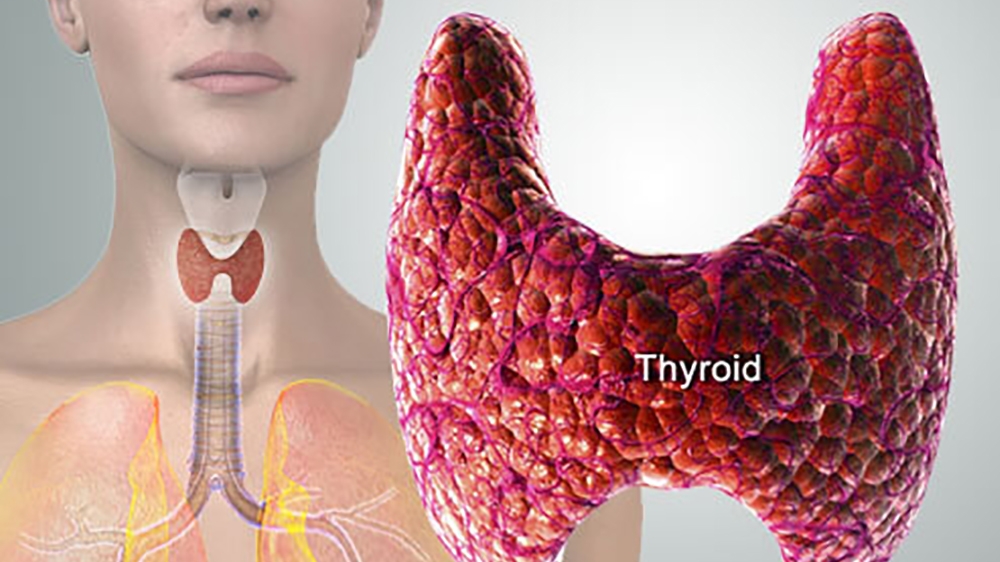Inside This Article You’ll Discover…
- The Most Common Reasons Women Get Thyroid Problems
- How to Tell if You Might Have a Thyroid Condition
- Why Some Thyroid Conditions are Reversible
- How to Determine if Your Doctor is Doing Everything Possible to Fix Your Thyroid Condition (Most are Not)
- New Advancements in the Treatment of Thyroid Conditions
- Why You May Not Need Medication at All
- The Different Types of Thyroid Conditions and Their Symptoms
- New Testing for Thyroid Disorders
Dear Thyroid Sufferer,
Some 20 million Americans are affected by thyroid disorders… that’s 1 in 13 people! And more than half of those people are unaware they have a thyroid problem because it frequently goes undiagnosed… until it gets severe.
According to the National Women’s Health Information Center, 1 in 8 women will experience a thyroid disorder during their lifetime. The reason why may surprise you because I’m sure you’ve never heard it explained to you… that’s because most doctors are only vaguely familiar with thyroid disorders.
My name is Dr. Mark A. Scott and I use a different approach in diagnosing and treating thyroid disorders.
After studying more about thyroid disorders, I realized how poorly diagnosed and treated thyroid conditions are. I also noticed a very disturbing trend in the current treatment approach for these conditions, which I’ll reveal in a moment…
Thyroid Hormones
First, let’s learn more about how the thyroid works. In healthy people, the thyroid makes just the right amounts of two thyroid hormones, T3 and T4. These hormones have important actions throughout the body. Most importantly, they regulate many aspects of our metabolism, affecting how many calories we burn, how warm we feel, how much we weigh… and our general well-being.
In short, the thyroid “runs” our metabolism—it’s literally the “gas pedal” of the body.
Thyroid hormones also have direct effects on most organs, including the heart which beats faster and harder under the influence of increased thyroid hormones (this is why heart problems can often accompany chronic thyroid problems in women, and perhaps why heart problems are more common in women under the age of 50).
T3 is the more biologically active hormone (it’s more important for cellular function), and in fact most of T4 (80%) is converted to T3 in the body’s peripheral tissues. So T4 is just a precursor for the more active hormone, T3.
One of the problems in some thyroid disorders is that you may have trouble converting T4 to T3 in your tissues (have you been checked for this?). This can create a deficiency of T3, disrupting the body’s ability to properly regulate metabolism… leading to specific symptoms.
One of the controversial aspects of the most common thyroid medication, Synthroid, is that it is only T4. If you have difficulty converting T4 to T3 (and Synthroid is a synthetic form of T4, mind you) then this medication is not as effective.
Iodine is the primary element of T3 and T4 (T3 contains three iodine molecules and T4 contains four iodine molecules, respectively). This makes iodine essential to the production of these two important thyroid hormones.
Here’s a little known public fact related to iodine: in addition to the thyroid gland, iodine is also involved in ovarian function, and a deficiency has been linked to ovarian cysts and even ovarian cancer. In addition, iodine is important for normal breast tissue and deficiencies have been linked to breast cancer.
Why is this relevant? Some people postulate that the primary reason for an increased incidence of thyroid disorders in women is due to the fact that their breast tissue and ovaries compete with the thyroid gland for any available iodine. Hmmm…
Many studies suggest we do not get an adequate amount of iodine—especially in the Midwest. This area is notorious for low iodine levels and used to be known as the “Goiter Belt” as a result (a goiter is when the thyroid gland enlarges due to lack of iodine)!
Before we go any further, let’s cover the three primary types of thyroid conditions:
- Hypothyroidism
- Hyperthyroidism or Graves’
- Hashimoto’s thyroiditis
Symptoms of Hypothyroidism (slow thyroid)
- Do you feel fatigued, tired or sluggish?
- Do you have cold feet and/or hands?
- Do you require excessive amounts of sleep to function?
- Do you gain weight easily or have difficulty losing weight?
- Do you have difficult or infrequent bowel movements (constipation)?
- Are you depressed?
- Do you lack motivation?
- Do you suffer from morning headaches that wear off as the day progresses?
- Do you suffer from thinning hair or excessive hair falling out?
- Do you suffer from dryness of the skin and/or scalp?
- Do you suffer from mental sluggishness?
Hypothyroidism is a condition in which the body lacks sufficient thyroid hormones. Since the main purpose of thyroid hormones is to “run the body’s metabolism,” it is logical that people with this condition will have symptoms associated with a slow metabolism.
Millions of Americans have this more common medical condition… and it often goes undetected in the early stages. Were you told that your results were “normal” and yet you continue to have symptoms?
Symptoms of Hyperthyroidism or Graves’ Disease (overfunctioning thyroid)
- Do you experience heart palpitations?
- Do you suffer from inward trembling?
- Do you have an increased pulse even at rest?
- Are you nervous and/or emotional?
- Do you suffer from insomnia?
- Do you experience night sweats?
- Do you have difficulty gaining weight?
Hyperthyroidism is the medical term to describe an over production of thyroid hormones. Although this condition is less common, it can precede a slowing down of the thyroid. It’s usually easier to treat though.
Hashimoto’s Thyroiditis
Hashimoto’s thyroiditis is a condition in which the body’s immune system attacks the thyroid gland (this is an auto-immune disorder).
It is diagnosed by checking for thyroid antibodies (TPO & TGB) and gluten antibodies.
Patients suffering from Hashimoto’s thyroiditis will experience symptoms of hypothyroidism AND hyperthyroidism… MEANING they will experience some or ALL of the above symptoms.
Since the thyroid gland controls the body’s metabolism, it can affect all of the systems of the body such as the gut, liver, gall bladder, hormones, cholesterol, brain (via neurotransmitters), adrenal glands, breasts, ovaries, and heart.
In the next article I will go into detail on Understanding Thyroid Markers and Panels and The Influence of Thyroid Hormones on Physiological and Metabolic Function to further help you understand more about thyroid conditions. This will explain in detail how the thyroid gland affects all of the body’s systems. You will be amazed how the thyroid gland AFFECTS EVERY OTHER SYSTEM IN THE BODY!
Get more information on natural thyroid treatment or schedule a free thyroid consultation with Dr. Mark A. Scott of Total Health Care Virginia Beach.
Disclaimer: This page is for informational purposes only. It is not designed to substitute for professional and individualized health advice. Please do not stop or start taking prescription medication without the advice of your prescribing doctor, as this can be very dangerous to your health. You should always consult your prescribing doctor regarding prescription drugs.

